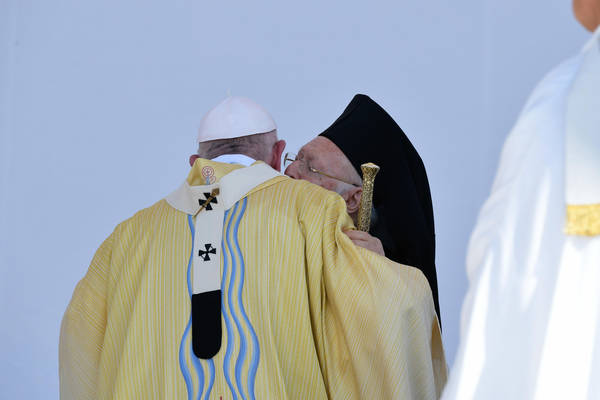(ANSA-AFP) - BRATISLAVA, SEP 13 - Pope Francis called for
Europe to show "solidarity" around the world during economic
recovery from the Covid-19 pandemic, speaking on a visit to
Slovakia -- one of the worst hit countries in Europe. On his
first foreign trip since a colon operation in July, the
84-year-old Argentine pontiff called the pandemic "the great
test of our own time". "It has taught us how easy it is, even
when we are all in the same boat, to withdraw and think only of
ourselves," he said. Slovakia, a European Union member with a
population of 5.4 million, had the highest per capita Covid-19
contagion and mortality rates in the world for several weeks
this year. "After long and trying months of pandemic, fully
conscious of the difficulties to be faced, we look forward with
hope to an economic upturn favoured by the recovery plans of the
European Union," the pope said in the Slovak capital,
Bratislava. But he warned against "a fleeting sense of euphoria"
and a focus on profits as countries begin to recover and called
instead for Europe to display "a solidarity that, by
transcending borders, can bring it back to the centre of
history". The pope is also due to meet with members of
Slovakia's Jewish community later on Monday, a day after warning
that anti-Semitism was still "lurking" around the world. The
meeting will take place on Rybne Square in what used to be a
Jewish neighbourhood of Bratislava where a synagogue that was
torn down in Communist times once stood. Three days before the
pope's arrival, Slovakia's government issued an apology for the
first time for the role played in the Holocaust by the Nazi
puppet regime in power at the time. "The Slovak cabinet feels a
moral duty to publicly express regret over the crimes committed
by the ruling power of that time," it said, emphasising in
particular the "condemnable" anti-Jewish laws adopted in 1941.
Under the orders of the then-government headed by a Catholic
priest, Jozef Tiso, tens of thousands of Slovak Jews were
deported and killed. A memorial on Rybne Square commemorates the
105,000 victims of the Holocaust in Slovakia. After the war,
most of the survivors either emigrated or stayed and hid their
Jewish identity. Under Communism, Jews were prosecuted and
jailed for alleged Zionist crimes, and the regime banned
practising their religion. The community now numbers only around
2,000 people and anti-Jewish attitudes remain strong in
Slovakia, a predominantly Catholic country. (ANSA-AFP).
© Copyright ANSA - All rights reserved














